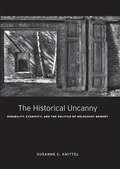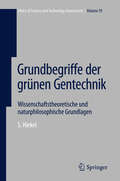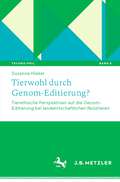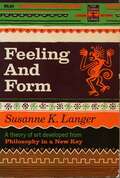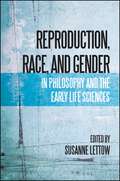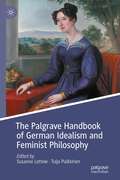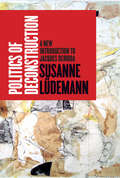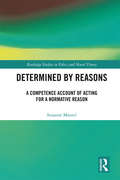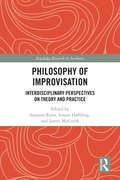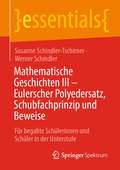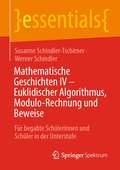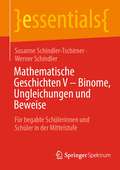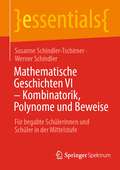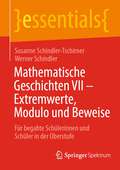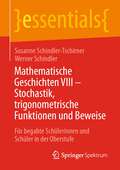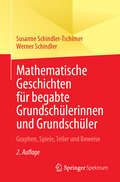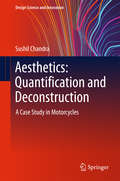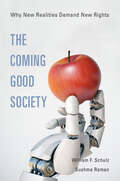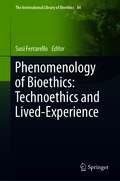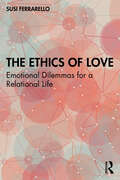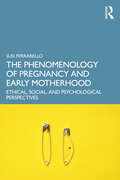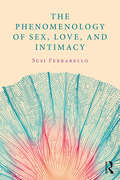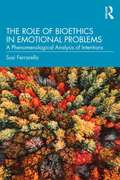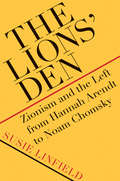- Table View
- List View
The Historical Uncanny: Disability, Ethnicity, and the Politics of Holocaust Memory
by Susanne C. KnittelThe Historical Uncanny explores how certain memories become inscribed into the heritage of a country or region while others are suppressed or forgotten. In response to the erasure of historical memories that discomfit a public’s self-understanding, this book proposes the historical uncanny as that which resists reification precisely because it cannot be assimilated to dominant discourses of commemoration.Focusing on the problems of representation and reception, the book explores memorials for two marginalized aspects of Holocaust: the Nazi euthanasia program directed against the mentally ill and disabled and the Fascist persecution of Slovenes, Croats, and Jews in and around Trieste. Reading these memorials together with literary and artistic texts, Knittel redefines “sites of memory” as assemblages of cultural artifacts and discourses that accumulate over time; they emerge as a physical and a cultural space that is continually redefined, rewritten, and re-presented.In bringing perspectives from disability studies and postcolonialism to the question of memory, Knittel unsettles our understanding of the Holocaust and its place in the culture of contemporary Europe.
Grundbegriffe der grünen Gentechnik
by Susanne HiekelDie Autorin analysiert grundlegende Begrifflichkeiten, die in der normativen Argumentation zur grünen Gentechnik verwendet werden, und liefert damit eine philosophisch fundierte Argumentationsgrundlage. Sie geht von der Annahme aus, dass Begriffe wie z. B. Lebewesen, (natürliche) Art oder Gen in verschiedenen Bedeutungsnetzen unterschiedlich konnotiert sind und daher nicht kontextunabhängig definiert werden können. Die Begriffsklärung ist notwendige Voraussetzung, um zu einer angemessenen Bewertung der grünen Gentechnik kommen zu können.
Tierwohl durch Genom-Editierung?: Tierethische Perspektiven auf die Genom-Editierung bei landwirtschaftlichen Nutztieren (Techno:Phil – Aktuelle Herausforderungen der Technikphilosophie #8)
by Susanne HiekelDer Einsatz neuer biotechnologischer Verfahren, wie der der Genom-Editierung, hat die Debatte um die ethische Zulässigkeit einer gentechnischen Veränderung von Tieren neu entflammt. Die Motivation zu genomeditorischen Züchtungsvorhaben ist, so wie bei „konventionellen“ Vorhaben auch, zumeist produktions- und leistungsorientiert. Es gibt vereinzelt aber auch Vorhaben, die darauf abzielen, dem tierlichen Wohl zugutezukommen. Dieser Zusammenhang des „Tierwohls durch Genom-Editierung“ wirft einige Forschungsfragen auf: Wodurch sind die Verfahren der Genom-Editierung in der Nutztierzucht überhaupt charakterisiert? Wie lässt sich das Anwendungsspektrum von genomeditorischen Nutztier-Zuchtvorhaben, die das tierliche Wohl befördern sollen, genauer beschreiben? Ist das Wohlergehen „zukünftiger Tiere“ überhaupt von moralischer Relevanz (Problem der Nicht-Identität)? Sind genomeditorische Zuchtvorhaben möglicherweise generell abzulehnen, weil sie die Integrität der betroffenen Tiere verletzen? Wie sind genomeditorische Zuchtvorhaben, die das Wohl von landwirtschaftlichen Nutztieren befördern sollen, aus tierwohltheoretischer Perspektive zu beurteilen? Wie – falls überhaupt – lassen sich Handlungen rechtfertigen, die zwar einerseits zur Perpetuierung einer moralisch problematischen Praxis beitragen, andererseits aber in bestimmter Hinsicht gegenüber dieser problematischen Praxis eine Verbesserung bedeuten? Antworten auf diese Fragen stellt dieses Buch bereit.
Feeling and Form: A Theory of Art Developed from Philosophy in a New Key
by Susanne K. LangerIn Philosophy in a New Key, Susanne Langer developed a theory of symbolism, there applied to music, which she felt could be developed to embrace all the arts. In Feeling and Form she did just that. It offers the reader nothing less than a systematic, comprehensive theory of art, applied in turn to painting, sculpture, architecture, literature, music, the dance, drama and film.
Reproduction, Race, and Gender in Philosophy and the Early Life Sciences: In Philosophy And The Early Life Sciences (SUNY series, Philosophy and Race)
by Susanne LettowFocusing on the late eighteenth and early nineteenth centuries, this volume highlights the scientific and philosophical inquiry into heredity and reproduction and the consequences of these developing ideas on understandings of race and gender. Neither the life sciences nor philosophy had fixed disciplinary boundaries at this point in history. Kant, Hegel, and Schelling weighed in on these questions alongside scientists such as Caspar Friedrich Wolff, Johann Friedrich Blumenbach, and Karl Ernst von Baer. The essays in this volume chart the development of modern gender polarizations and a naturalized, scientific understanding of gender and race that absorbed and legitimized cultural assumptions about difference and hierarchy.
The Palgrave Handbook of German Idealism and Feminist Philosophy (Palgrave Handbooks in German Idealism)
by Tuija Pulkkinen Susanne LettowThis book gives a comprehensive overview of the ways in which the relation between German Idealism and feminist philosophy has been explored. It demonstrates the significance of German Idealism for feminist philosophy, and simultaneously brings out the relevance of feminist readings and interpretations for a critical understanding of German Idealism. Key Features: • Presents original work on the German Idealists and considers their legacy within feminist thought from different philosophical perspectives. • Incorporates perspectives from queer theory, new materialism and critical philosophy of race, and so explores German Idealism through the subversion and transformation of meanings and conceptual arrangements. • Challenges the epistemic boundaries of philosophy by engaging the thought of women contemporary with the German Idealists such as Bettina von Arnim and Karoline von Günderrode. • Places the work of the German Idealists on gender, sexuality, marriage and family within the wider contexts of colonialism and European nation building. • Considers how several key concepts of German Idealism (such as subject, reason, enlightenment, autonomy and the sublime) have been central targets of feminist theory. • Includes a Black feminist critique of Kantian universalism. Fully reflecting the diversity that characterizes feminist thinking today, The Palgrave Handbook of German Idealism and Feminist Philosophy is essential reading for scholars and graduate students of German idealism, feminist philosophy and feminist theory.
Politics of Deconstruction: A New Introduction to Jacques Derrida
by Susanne Lüdemann translated by Erik ButlerThe book offers a new introduction to Jacques Derrida and to Deconstruction as an important strand of Continental Philosophy. From his early writings on phenomenology and linguistics to his later meditations on war, terrorism, and justice, Jacques Derrida (1930–2004) achieved prominence on an international scale by addressing as many different audiences as he did topics. Yet despite widespread acclamation, his work has never been considered easy. Rendering accessible debates that marked more than four decades of engagement and inquiry, Susanne Lüdemann traces connections between the philosopher's own texts and those of his many interlocutors, past and present. Unlike conventional introductions, Politics of Deconstruction offers a number of personal approaches to reading Derrida and invites readers to find their own. Emphasizing the relationship between philosophy and politics, it shows that, with Deconstruction, there is much more at stake than an "academic" discussion, for Derrida's work deals with all the burning political and intellectual challenges of our time. The author's own professional experience in both the United States and in Europe, which particularly inform her chapter on Derrida's reception in the United States, opens a unique perspective on a unique thinker, one that rewards specialists and newcomers alike.
Determined by Reasons: A Competence Account of Acting for a Normative Reason (Routledge Studies in Ethics and Moral Theory)
by Susanne MantelThis book offers a new account of what it is to act for a normative reason. The first part of the book introduces some popular ideas and problems concerning causal and dispositional approaches of acting for reasons. The author argues that the dispositional approach should take a certain form that unites epistemic, volitional, and executional dispositions in a complex normative competence. This "Normative Competence Account" allows for more and less reflective ways of acting for normative reasons. The second part of the book clarifies the relation between the normative reason that an agent acts for and his or her motivating reasons. The chapters in this part refute the widely held "identity view" that acting for a normative reason requires the normative reason to be identical with a motivating reason. The author describes how normative reasons are related to motivating reasons by a relation of correspondence, and proposes a new understanding of how normative reasons explain those actions that are performed for them. Determined by Reasons engages with current debates from a wide range of different philosophical areas, including action theory, metaethics, moral psychology, epistemology, and ontology, to develop a new account of normative reasons.
Philosophy of Improvisation: Interdisciplinary Perspectives on Theory and Practice (Routledge Research in Aesthetics)
by Susanne Ravn; Simon Høffding; James McGuirkThis volume brings together philosophical and interdisciplinary perspectives on improvisation. The contributions connect the theoretical dimensions of improvisation with different viewpoints on its practice in the arts and the classroom. The chapters address the phenomenon of improvisation in two related ways. On the one hand, they attend to the lived practices of improvisation both within and without the arts in order to explain the phenomenon. They also extend the scope of improvisational practices to include the role of improvisation in habit and in planned action, at both individual and collective levels. Drawing on recent work done in the philosophy of mind, they address questions such as whether improvisation is a single unified phenomenon or whether it entails different senses that can be discerned theoretically and practically. Finally, they ask after the special kind of improvisational expertise which characterizes musicians, dancers, and other practitioners, an expertise marked by the artist’s ability to participate competently in complex situations while deliberately relinquishing control. Philosophy of Improvisation will appeal to anyone with a strong interest in improvisation, to researchers working in philosophy, aesthetics, and pedagogy as well as practitioners involved in different kinds of music, dance, and theater performances.
Philosophy of Improvisation: Interdisciplinary Perspectives on Theory and Practice (Routledge Research in Aesthetics)
by Susanne Ravn; Simon Høffding; James McGuirkThis volume brings together philosophical and interdisciplinary perspectives on improvisation. The contributions connect the theoretical dimensions of improvisation with different viewpoints on its practice in the arts and the classroom. The chapters address the phenomenon of improvisation in two related ways. On the one hand, they attend to the lived practices of improvisation both within and without the arts in order to explain the phenomenon. They also extend the scope of improvisational practices to include the role of improvisation in habit and in planned action, at both individual and collective levels. Drawing on recent work done in the philosophy of mind, they address questions such as whether improvisation is a single unified phenomenon or whether it entails different senses that can be discerned theoretically and practically. Finally, they ask after the special kind of improvisational expertise which characterizes musicians, dancers, and other practitioners, an expertise marked by the artist’s ability to participate competently in complex situations while deliberately relinquishing control. Philosophy of Improvisation will appeal to anyone with a strong interest in improvisation, to researchers working in philosophy, aesthetics, and pedagogy as well as practitioners involved in different kinds of music, dance, and theater performances.
Mathematische Geschichten III – Eulerscher Polyedersatz, Schubfachprinzip und Beweise: Für begabte Schülerinnen und Schüler in der Unterstufe (essentials)
by Susanne Schindler-Tschirner Werner SchindlerEinsatzfertige Lerneinheiten vermitteln fundamentale mathematische Techniken, die weit über die Unterstufe hinaus von Bedeutung sind. Die Lerninhalte eignen sich auch zur gezielten Vorbereitung auf Mathematikwettbewerbe. Die Schüler*innen lernen das Schubfachprinzip und den Eulerschen Polyedersatz kennen und führen Beweise in verschiedenen Kontexten. Es werden abwechslungsreiche Bewegungsaufgaben und vielfältige Fragestellungen aus der Kombinatorik in unterschiedlichen Schwierigkeitsgraden bearbeitet. Die Aufgaben fördern die mathematische Denkfähigkeit, Phantasie und Kreativität. Die ausführlichen Musterlösungen sind auch für Nicht-Mathematiker*innen verständlich.
Mathematische Geschichten IV – Euklidischer Algorithmus, Modulo-Rechnung und Beweise: Für begabte Schülerinnen und Schüler in der Unterstufe (essentials)
by Susanne Schindler-Tschirner Werner SchindlerEinsatzfertige Lerneinheiten vermitteln fundamentale mathematische Techniken, die weit über die Unterstufe hinaus von Bedeutung sind. Die Lerninhalte eignen sich auch zur gezielten Vorbereitung auf Mathematikwettbewerbe. Die Schüler*innen lernen den Euklidischen Algorithmus kennen und anzuwenden, und die Modulo-Rechnung wird ausführlich behandelt. Stellenwertsysteme und ungewöhnliche Anwendungen der binomischen Formeln runden diesen Band ab. Zu allen Themengebieten führen die Schüler*innen Beweise und lernen unterschiedliche Beweistechniken. Die Aufgaben fördern die mathematische Denkfähigkeit, Phantasie und Kreativität. Die ausführlichen Musterlösungen sind auch für Nicht-Mathematiker*innen verständlich.
Mathematische Geschichten V – Binome, Ungleichungen und Beweise: Für begabte Schülerinnen und Schüler in der Mittelstufe (essentials)
by Susanne Schindler-Tschirner Werner SchindlerEinsatzfertige Lerneinheiten vermitteln fundamentale mathematische Techniken, die weit über die Mittelstufe hinaus von Bedeutung sind. Die Lerninhalte eignen sich auch zur gezielten Vorbereitung auf Mathematikwettbewerbe. Die Schüler*innen lernen das universelle Beweisverfahren der vollständigen Induktion in unterschiedlichen Anwendungskontexten kennen. Abwechslungsreiche Aufgaben zu binomischen Formeln mit beliebigen natürlichen Exponenten, Ungleichungen und Geometrie am Kreis runden den Band ab. Die Aufgaben fördern die mathematische Denkfähigkeit, Phantasie und Kreativität. Die Musterlösungen sind auch für Nicht-Mathematiker*innen verständlich.
Mathematische Geschichten VI – Kombinatorik, Polynome und Beweise: Für begabte Schülerinnen und Schüler in der Mittelstufe (essentials)
by Susanne Schindler-Tschirner Werner SchindlerEinsatzfertige Lerneinheiten vermitteln fundamentale mathematische Techniken, die weit über die Mittelstufe hinaus von Bedeutung sind. Die Lerninhalte eignen sich auch zur gezielten Vorbereitung auf Mathematikwettbewerbe. Die Schüler*innen wenden den Euklidischen Algorithmus auf Polynome an und lernen den erweiterten Euklidischen Algorithmus kennen. Abwechslungsreiche Aufgaben in unterschiedlichen Schwierigkeitsgraden vertiefen die Kombinatorik und führen in die Stochastik ein. Die Schüler*innen führen Beweise in unterschiedlichen Gebieten. Die Aufgaben fördern die mathematische Denkfähigkeit, Phantasie und Kreativität. Die Musterlösungen sind auch für Nicht-Mathematiker*innen verständlich.
Mathematische Geschichten VII – Extremwerte, Modulo und Beweise: Für begabte Schülerinnen und Schüler in der Oberstufe (essentials)
by Susanne Schindler-Tschirner Werner SchindlerEinsatzfertige Lerneinheiten vermitteln fundamentale mathematische Techniken, die über die Oberstufe hinaus von Bedeutung sind. Die Lerninhalte eignen sich auch zur gezielten Vorbereitung auf Mathematikwettbewerbe. Den Anfang machen universelle Beweistechniken, die in unterschiedlichen Kontexten angewandt werden. Es folgen lineare Kongruenzen, die Eulersche j-Funktion und der Satz von Euler. Abwechslungsreiche Aufgaben wiederholen und vertiefen den Umgang mit Ungleichungen. Die Schüler*innen führen Beweise in unterschiedlichen Gebieten. Die Aufgaben fördern die mathematische Denkfähigkeit, Phantasie und Kreativität.
Mathematische Geschichten VIII – Stochastik, trigonometrische Funktionen und Beweise: Für begabte Schülerinnen und Schüler in der Oberstufe (essentials)
by Susanne Schindler-Tschirner Werner SchindlerEinsatzfertige Lerneinheiten vermitteln fundamentale mathematische Techniken, die weit über die Oberstufe hinaus von Bedeutung sind. Die Lerninhalte eignen sich auch zur gezielten Vorbereitung auf Mathematikwettbewerbe. Schwerpunkte bilden Stochastik und trigonometrische Funktionen. Es wird mit Erwartungswerten gerechnet, in die Spieltheorie eingeführt, und es werden der Sinussatz und Additionstheoreme für Sinus und Cosinus behandelt. Hinzu kommen Exkurse in die Aussagenlogik und die Graphentheorie. Die Schüler*innen führen Beweise in unterschiedlichen Gebieten. Die Aufgaben fördern die mathematische Denkfähigkeit, Phantasie und Kreativität.
Mathematische Geschichten für begabte Grundschülerinnen und Grundschüler: Graphen, Spiele, Teiler und Beweise
by Susanne Schindler-Tschirner Werner SchindlerEntdecken und fördern Sie mit diesem inspirierenden und praxisnahen Buch das Potenzial mathematisch begabter Grundschülerinnen und Grundschüler in der 3. und 4. Klasse! Sorgfältig ausgearbeitete, größtenteils praxiserprobte Lerneinheiten sind in eine spannende Geschichte eingebunden. Die Aufgaben fördern die mathematische Denkfähigkeit, Phantasie und Kreativität. Unter anderem lernen die Schülerinnen und Schüler, schwierige Probleme schrittweise auf einfachere zurückzuführen und Beweise in unterschiedlichen Kontexten zu führen. Die ausführlichen Musterlösungen sind auch für Nicht-Mathematikerinnen und Nicht-Mathematiker verständlich. Daher eignet sich dieses Buch sowohl für Lehrkräfte als auch für Eltern. Ob in Arbeitsgemeinschaften, Förderkursen oder zur Vorbereitung auf Mathematikwettbewerbe: Dieses Buch macht Mathematik zu einem Abenteuer voller Entdeckungen und Erfolgserlebnisse! Der Inhalt umfasst Themen, die weit über die Grundschule hinaus von Bedeutung sind, etwa: Wegeprobleme und Worträtsel werden durch ungerichtete bzw. gerichtete Graphen modelliert und gelöst. Einfache mathematische Spiele werden systematisch analysiert und die optimalen Strategien bestimmt. Die Gaußsche Summenformel und Rekursionsformeln werden hergeleitet und angewandt. Mehrere Kapitel befassen sich mit Primfaktoren und Teilern. Für das Rechnen mit Resten wird die Modulo-Rechnung eingeführt und angewandt. Ferner werden Würfelnetze, Kryptogramme und kombinatorische Fragestellungen behandelt Dieses Buch ist aus zwei essentials hervorgegangen und wurde im Rahmen der Neuauflage deutlich erweitert.
Aesthetics: A Case Study in Motorcycles (Design Science and Innovation)
by Sushil ChandraThis book addresses a perennial challenge for product planners and designers alike: how to objectively specify and quantify the aesthetics of products. It provides automotive product planners with a framework for the grammar of aesthetics and a tool for quantifying the aesthetics of an intended product. Further, it equips styling designers with a tool for connecting engineering and aesthetics. Given the author's extensive experience in motorcycle design, the motorcycle has been chosen as the frame of reference for automobiles. Specifically in the field of automobile design, where engineering and aesthetics go hand in hand, it also becomes important to clearly and objectively define the relationship between engineering design and aesthetics. Accordingly, this book (1) clearly establishes the objective parameters of aesthetics, (2) puts forward a method for quantifying aesthetics, (3) identifies the engineering design parameters affecting aesthetics, and (4) determines the relationship between parameters of aesthetics and engineering design. As such, it offers a useful guide not only for design professionals, but also for students and researchers of design.
The Coming Good Society: Why New Realities Demand New Rights
by William F. Schulz Sushma Ramen&“Challenge[s] all of us to think deeply about what kind of society we and our children and our children&’s children will want to live in.&” (Margaret L. Huang, former Executive Director, Amnesty International USA) A rights revolution is under way. Today the range of nonhuman entities thought to deserve rights is exploding. Changes in norms and circumstances require the expansion of rights: What new rights, for example, are needed if we understand gender to be nonbinary? Does living in a corrupt state violate our rights? When biotechnology is used to change genetic code, whose rights might be violated? What rights, if any, protect our privacy from the intrusions of sophisticated surveillance techniques? Drawing on their vast experience as human rights advocates, William Schulz and Sushma Raman challenge us to think hard about how rights evolve with changing circumstances, and what rights will look like ten, twenty, or fifty years from now. The Coming Good Society details the many frontiers of rights today and the debates surrounding them. Schulz and Raman equip us with the tools to engage the present and future of rights so that we understand their importance and know where we stand. &“Thoughtful and provocative.&” —Human Rights Quarterly &“[A] trail-blazing map through the new frontiers of rights . . . downright riveting.&” —Gloucester Times &“An accessible primer for anyone who wishes to understand the current limitations in our notions of rights and the future challenges for which we must prepare.&” —Kerry Kennedy, President, Robert F. Kennedy Human Rights &“Schulz and Raman outline brilliantly where [human rights] growth may take rights in the generations to come.&” ―Zeid Ra&’ad al-Hussein, former United Nations High Commissioner for Human Rights
Phenomenology of Bioethics: Technoethics and Lived-Experience (The International Library of Bioethics #84)
by Susi FerrarelloThis book offers a unique description of how phenomenology can help professionals from medical, environmental and social fields to explore notions such as interaffectivity, empathy, epoche, reduction, and intersubjective encounter. Written by a group of top scholars, it uniquely covers the relationship between phenomenology and bioethics, and focuses not only on medical cases, but also on the environment and emerging technologies. This variety of themes, whilst including techno-ethics, environmental ethics, animal ethics, and medical ethics, is conducive to appreciating broadly how phenomenology can improve our quality of our life. Despite its difficult themes, the book appeals to an audience of both academics and professionals who are willing to understand how to increase the quality of care in their professional field.Chapter 8 is available open access under a Creative Commons Attribution 4.0 International License via link.springer.com.
The Ethics of Love: Emotional Dilemmas for a Relational Life
by Susi FerrarelloThis book explores the ethical and psychological dilemmas connected to the lived experiences of love, uniquely proposing an ethical framework that can be applied in loving relationships. The book provides an introduction to the study of ethics, moral psychology, and ancient philosophy. Examining key themes of love, such as unconditional love, romantic love, anger, desperation, and fairness, this book offers the reader a way to exercise and strengthen their personal critical thinking on ethical dilemmas, especially in relation to loving feelings. The author believes that ethics is the heart of love in the same way as logic is the brain of reasoning; we do not need ethics to love but we can love in a much healthier way if we train our ethical skills to love. After laying the theoretical framework for the book, chapters are organized into themes relating to ethical problems and begin with an exemplary piece from Greek and Latin literature. Using these writings as a starting point, Susi Ferrarello discusses whether it is possible to have a sound ethical theory of love, especially in cases relating to justice, despair, and rage, and demonstrates how this framework can be applied in new and established relationships. Filled with case studies throughout, spiritual exercises are listed at the end of chapters to help the reader increase their understanding of love and their ethical choices surrounding emotional dilemmas. This interdisciplinary book is essential reading for undergraduate and graduate students who take classes on ethics, marriage and family therapy, psychology, philosophy, classics, ancient philosophy, and politics, as well as those interested in the ethics of love and emotional decision-making.
The Phenomenology of Pregnancy and Early Motherhood: Ethical, Social, and Psychological Perspectives
by Susi FerrarelloThe Phenomenology of Pregnancy and Early Motherhood provides an ethical, social, and psychological investigation of the process of becoming a mother. Through a phenomenological analysis that engages with feminist philosophy, medical ethics, philosophy of care, and phenomenological psychology, Susi Ferrarello unravels the intricacies of this transformative phase of life to shed light on layers of lived experiences that impact the well-being of the woman. This book addresses the complexity of common lived-experiences characterizing this transition; the overarching period from the first to the fourth trimester, issues concerning maternal-fetal bonding, breastfeeding, PDAM, loss of identity and coming back to work. Enriched by case studies from Ferrarello’s philosophical counseling practice, the book provides a compassionate and insightful exploration of the struggles, triumphs, and moments of self-revelation that mothers encounter in their daily lives. By exploring the heart of the maternal experience, this book shows the often-unspoken realities faced by women as they strive to balance their roles as caregivers, partners, and individuals. The book offers a powerful means for everyday reflection on early motherhood and the ethical, as well as practical, dilemmas it raises. This text is an essential resource for graduate students studying phenomenology, ethics, feminist philosophy, moral psychology, as well as therapists and professionals interested in the challenges of pregnancy, motherhood, and women’s mental health.
The Phenomenology of Sex, Love, and Intimacy
by Susi FerrarelloThe Phenomenology of Sex, Love, and Intimacy presents a phenomenological exploration of love as it manifests itself through sexual desires and intimate relationships. Setting up a unique dialogue between psychology and philosophy, Susi Ferrarello offers a perspective through which clinicians can inform their practice on diverse issues of human sexuality. Drawing on Husserl’s phenomenology, Ferrarello’s analysis of love spans a range of disciplines including psychology, theology, biology, epistemology, and axiology, as well as areas related to gender, consent, and political control. Combining Husserlian perspectives on ethics with a focus on lived-experience, this text will deepen therapists’ understanding of love as the subject of interdisciplinary inquiry and enable them to locate questions of sexuality and intimacy within an academic framework. With key theoretical principles included to allow clinicians to think through and clarify their practice, this book will be a valuable tool for sex therapists, marriage and family therapists, and counselors, as well as psychology and philosophy students alike.
The Role of Bioethics in Emotional Problems: A Phenomenological Analysis of Intentions
by Susi FerrarelloFollowing up from the previous book, Human Emotions and the Origins of Bioethics, thisvolume focuses on four psychological problems, anxiety, narcissism, restlessness,and emotional numbness, and explores how these problems influence bioethical issues and what bioethics can do to fix them. The Role of Bioethics in Emotional Problems presents a phenomenological exploration ofemotional intention and describes how one’s choices can determine a better relationship tothemselves and their community. Not only does this book provide the reader with an exhaustive account of the philosophical and psychological meaning of practical intentionality within Husserl’s phenomenology, but it also applies Husserl’s ethics to contemporary studies of human emotions and bioethical problems. Offering a non-reductionist model for an interdisciplinary inquiry into an emotional experience, it integrates clinical practice and articulates foundational knowledge of human emotional life at a professional level. Aimed at students of philosophy, psychology, psychotherapy, and bioethics, this book is a unique phenomenological dialogue between these disciplines on emotional well-being.
The Lions' Den: Zionism and the Left from Hannah Arendt to Noam Chomsky
by Susie LinfieldA lively intellectual history that explores how prominent midcentury public intellectuals approached Zionism and then the State of Israel itself and its conflicts with the Arab world In this lively intellectual history of the political Left, cultural critic Susie Linfield investigates how eight prominent twentieth-century intellectuals struggled with the philosophy of Zionism, and then with Israel and its conflicts with the Arab world. Constructed as a series of interrelated portraits that combine the personal and the political, the book includes philosophers, historians, journalists, and activists such as Hannah Arendt, Arthur Koestler, I. F. Stone, and Noam Chomsky. In their engagement with Zionism, these influential thinkers also wrestled with the twentieth century’s most crucial political dilemmas: socialism, nationalism, democracy, colonialism, terrorism, and anti-Semitism. In other words, in probing Zionism, they confronted the very nature of modernity and the often catastrophic histories of our time. By examining these leftist intellectuals, Linfield also seeks to understand how the contemporary Left has become focused on anti-Zionism and how Israel itself has moved rightward.
